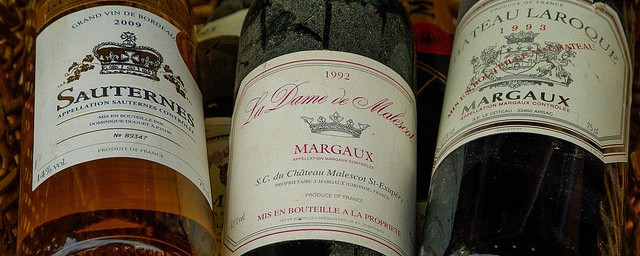
Why are Bordeaux wine (so) expensive?
Bordeaux wines are known worldwide thanks to their quality. However, most tend to associate a high price with Bordeaux wines.
Just to break down a myth : this is absolutely FALSE! Actually, in France, Burgundy wines are the most expensive ones.
So Bordeaux has two categories of wines :
- luxury wine (with cosmic prices)
- regular-priced wines (which are still high quality)
So yes, Bordeaux is home to some of the most expensive wines in the world. Why is that? Why is Bordeaux wine so expensive?
Like any other thing : Prestige and exclusivity
The golden rule for today’s market : brands. People respond to brands for absolutely EVERYTHING so, of course, wine is no exception.
Take Château Petrus for instance. If you ask someone who lived in the 1800s what Château Petrus was, they would have absolutely no idea. This brand formed in the 1990s, ie in the last century!

The bottles were sold for the late Queen Elisabeth II’s wedding. (and we do know how the whole world adores the British monarchy!). So Petrus scored high with that one.
But it didn’t stop. John F. Kennedy publicly declared it was his favorite wine and the famous wine enthusiast, Robert Parker gave Petrus a 100 (out of 100) score.
So we’ve got prestige with Petrus.
But moreover, Château Petrus has a VERY small vineyard, so now we’ve got exclusivity.
Mix prestige and exclusivity and you get yourself a wine with a cosmic price!
Same story goes for Château Yquem and Haut-Brion for example.
Another source of prestige for these wines is the 1855 Classification. For reminder’s sake, this classification of Médoc and Graves wines was established in 1855 (on order of Napoleon III). They were classified by PRICE and not quality. However, being called “Cru classé” and especially the “Grand Cru Classé” give them an aura of prestige, which sometimes differ from quality…
Last but not least, Bordeaux has a long-standing reputation so this adds up to the prestige of these wines of course.
Bordeaux has the perfect terroir
Wine is made from grapes. Yes okay, easy, I can see you rolling your eyes but bear with me. Grapes grow on vines that get what they need from the soil. So if you want good wine, you need good grapes and not only good soil but the good soil FOR your grapes. Get the nuance?
And Bordeaux’s soil matches perfectly with Merlot and Cabernet Sauvignon.
ANECDOTE : By the way, Bordeaux is home to Cabernet Sauvignon. The crossing between Cabernet Franc and Sauvignon Blanc, which gave birth to Cabernet Sauvignon, was made in Bordeaux.

The Right Bank has a lot of clay, and blue clay especially in the Pomerol area, which is a rare kind of soil. Clay soils have a high water retention capacity (which is useful in times of drought). However, these are heavy and cold soils. Thus, early ripening grape varieties are more suitable, which makes it perfect for Merlot. These soils give fleshy and powerful wines.
The Left Bank has essentially graveled soils. They are a mixture of pebbles, sands and clays. The pebbles are brought by the Garonne and the Dordogne. These soils absorb and transmit heat, which is ideal for Cabernet Sauvignon, a late-ripening grape variety. The wines are elegant with fine tannins, firm in their youth.
Climate change is actually good for Cabernet Sauvignon. These past few years, we were able to see this grape variety fully ripen without going overboard.
If you want to know more about the impact of soil on wines, I’ve written a whole article on the subject.
ANECDOTE : If you are curious about tasting Bordeaux wines, made like they used to or with the maximum “terroir effect”, I would recommend you visiting Liber Pater. The winemaker Loic Pasquet makes wines from indigenous grapes varieties grown on ungrafted vines. He, however, is one of Bordeaux’s most expensive wine.
The careful selection during winemaking
So we’ve got the perfect soil for our grapes. Great. Now if we want to make great wines, we need great grapes. And although it’s a perfect match with the soils, some will always be better than others.
That’s why winemakers carefully SELECT their grapes. Only the best for Bordeaux wines. (It also explains why Bordeaux wines are the best).

Bordeaux appellation has a very strict specification. These specifications concern the selection of the grapes and the maximum yield for example.
By limiting the yield, the flavors are more concentrated in the berries, which will make more concentrated wines, which is preferable.
In July, a lot of green harvesting is done in Bordeaux for example. Man wine growers will remove extra bunches of grapes on the vine. This will help balance the leaf area and concentrate the flavors.
Balancing the leaf area means the grapes will reach better ripeness. Indeed, the leaves are responsible for the photosynthesis, that produces the sugar in order for the grapes to ripen. So if the leaf area is not well-balanced with the number of berries, some will never reach full ripeness.
Another rule in Bordeaux is hand-harvesting. This enables the winemakers to choose their berries and select the best ones. If you have the best grapes, chances are you’ll produce the best wine you can. By not using ALL the grapes they can produce, Bordeaux focuses only on the healthy grapes.
What are the factors influencing on the price of wine?
First, the production costs fall into two categories, VITICULTURE and WINEMAKING.
Concerning the VINEYARD, the land itself is not cheap and the wine grower must then prepare the soil, buy the vines, plant them AND take care of them during the whole year. The tools for laboring (and harvesting) are also EXPENSIVE at the purchase and these machines must be maintained, which adds to the fees.

Moreover, Bordeaux has an unpredictable weather.
Indeed, Bordeaux is located in a temperate oceanic climate and enjoying the Gulf Stream effect, a WARMING ocean current that extends the vegetative cycle of the vine. However, the ocean brings its share of RAIN, and therefore significant humidity.
The Landes forest and the coastal dunes make it possible to avoid the worst by protecting the vineyards from storms.
Thus, Bordeaux is subject to the VINTAGE effect. So the prices on the market of Bordeaux wines vary significantly from one year to another.
Same goes for PACKAGING of course with the bottles, the labels, the caps or corks ; some wineries even have bottles of SPECIFIC shapes which increases the costs as well.
The TRANSPORT, distribution and sale of wines is very complex and highly regulated. Indeed, the vast majority intend to sell on an international scale. This is one of the reasons why French wine is usually cheaper in France.
We must not forget either that certain appellations require for the wines to be aged or STORED before being delivered on the market. For winerie, that requires storage facilities and STOCKS, which can add up pretty quickly.
Of course, as mentioned in the first paragraph, tax is an important issue. The transport, distribution and sale of wines is a very COMPLEX aspect of the sector and is highly regulated and pretty much every government in the world taxes alcoholic beverages. Moreover, rates vary significantly from country to country.
The aging potential represents an investment opportunity
Last but not least, Bordeaux is the best thanks to its aging potential
Thanks to the tannins in Cabernet Sauvignon, Bordeaux’s red wines can be kept for a very long time.
This makes it also a worthwhile investment and explains a lot about the prices you can encounter for several Bordeaux wines

All in all, Bordeaux wine is usually seen as expensive du its prestige and exclusivity (the most prestigious vineyards are very small). The perfect match between its terroir and its two main grape varieties AND the winemaking process adds to the quality of the Bordeaux wines, and hence, the prestige. Their long-aging potential makes it perfect for investors.
But Bordeaux wines are not ALL expensive. Actually, a very small part of Bordeaux wines have cosmic prices. The main part can be found at very reasonable and affordable prices.
Keep in mind : a bottle is worth what someone is willing to pay for it. And if you’re not one of the über-rich (like me!), Bordeaux has 57 appellations which makes it the largest producer in wine appellations. So forget the old classification and look out for Cru Bourgeois for instance, which sometimes sell for even under 20 euros!
So if you want to find these affordable Bordeaux, you have two choices :
- go visit the wine region. And I’ve even prepared you a schedule and some examples for that.
- sign up for a wine club in order to taste Bordeaux wines and see if you like it. A great example of such a wine club is SomMailiier, which ships French wine from small-batch wineries in France directly to you!
Let me know in the comments which solution you choose! And if you come to France, send me an email and I’ll recommend a few places! (sign up to the newsletter to get my email address).



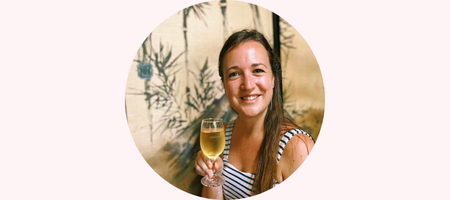

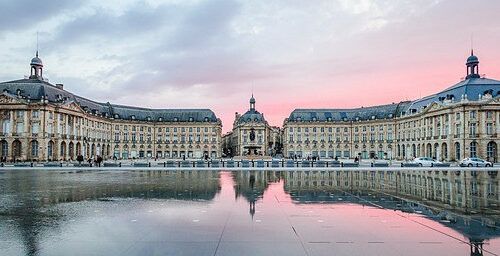
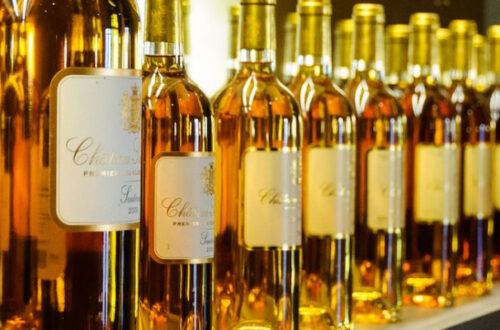
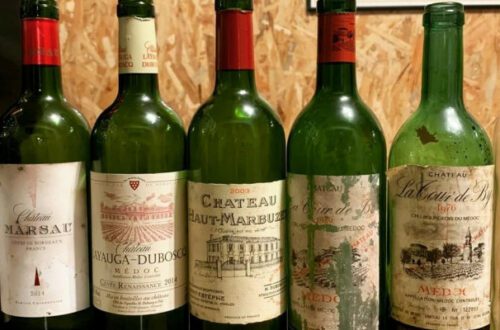
2 Comments
Jannette
To get good-tasting wine like Bordeaux wine, you have to pay the cost. I have purchased many wines that are just nasty at a cheaper cost, so I will continue paying for better-tasting wine. This was helpful in explaining why the Bordeaux wine cost more. When I hear of people complaining about the price, will share your article with them.
Mademoiselle
Thank you very much Jannette!